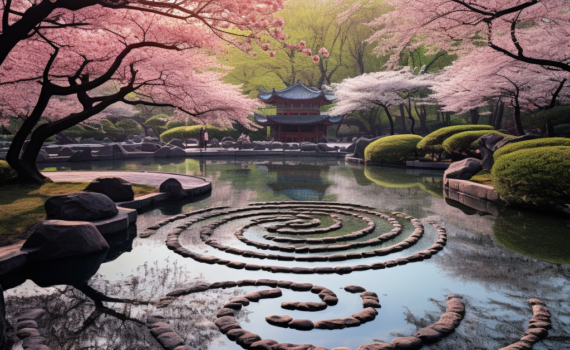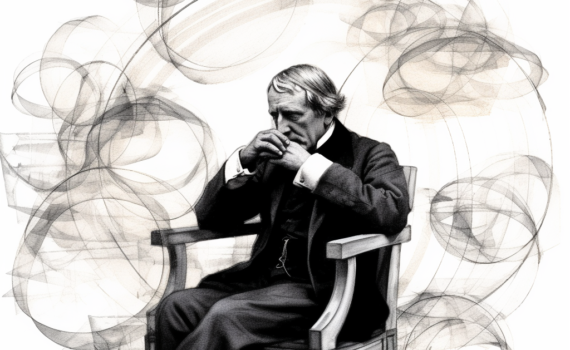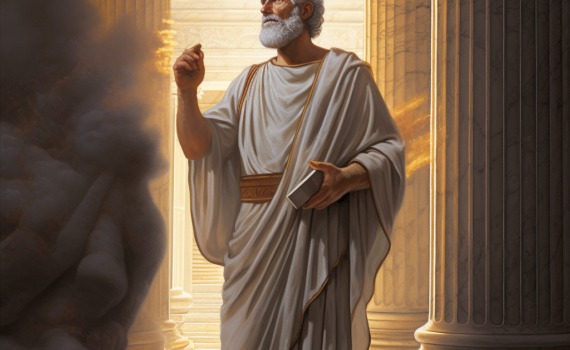Greetings, dear readers! It’s your inquisitive friend, Percival Q. Higginbottom, once again diving headlong into the deep and enthralling world of ideas. Today, we shall embark upon a thought-provoking expedition through the terrains of Eastern and Western philosophy, uncovering the contrasts and confluences that have shaped two of the world’s most captivating intellectual traditions. Eastern Philosophy: A Tapestry of Harmony The Eastern philosophical domain, primarily encompassing the traditions of China, India, Japan, and Korea, is often described as a harmonious tapestry woven with threads of interconnectedness and balance. Confucianism, Taoism, Buddhism, and Hinduism, among others, find their roots in this rich soil. One of the defining characteristics of Eastern philosophy is the focus on the interconnectedness of all things. Harmony and balance are sought within the individual, the community, and the cosmos. Concepts such as yin and yang, dharma, and karma elucidate a worldview where opposites coexist and interrelate, creating […]
Philosophy and thought
Ah, dear readers, it’s Percival Q. Higginbottom here, taking a brief respite from my usual musings to delve deep into a topic of utmost relevance in our modern age — the ethics surrounding Artificial Intelligence. With every leap in technological prowess, the machines around us grow smarter. But as they do, the moral conundrums they present grow more intricate. The Bias in the Machine One cannot broach the topic of AI ethics without addressing the matter of bias. Machine learning models, like ChatGPT or its more advanced siblings, learn from vast amounts of data. If this data carries even a hint of prejudice, the AI could magnify it. This has the potential to perpetuate societal stereotypes and worsen discrimination. It’s not the machine’s intent — for they have none — but the inadvertent reflections of the biases present in the data they’re fed. The Decision Makers From self-driving cars to […]
Greetings, my inquisitive companions, A thought, like a pebble, when tossed into the tranquil pool of the mind, creates ripples that expand to encompass our understanding of the world. And today, the pebble that I have for you is this: Can people truly change? This is not merely a question of changing one’s haircut, or developing a newfound fondness for opera. This query ventures into the heart of our identities — it seeks to understand if our essence, our very core, can be fundamentally altered. Some posit that people can change, pointing to the myriad examples of personal growth and transformation. We observe individuals overcoming their fears, shedding harmful habits, and embracing new perspectives. We witness acts of kindness from those once thought heartless, courage from the timid, and humility from the arrogant. There are countless tales of people rising like a phoenix from the ashes of their former selves, […]
Greetings, illustrious seekers of wisdom and curiosity! Today, I, Percival Q. Higginbottom, shall be your most humble guide through the alluring tapestries of philosophical contemplation. As we navigate the hallowed halls of human thought, I present you with a question: “Can we ever truly know anything with absolute certainty?” Ah, my dear friends, let us delve into the beguiling ballet of uncertainty and embrace the ambiguity in thought. The Prelude: The Charm of Uncertainty The charm of uncertainty lies in its nebulous embrace; it surrounds us like a delicate mist on a crisp autumn morning. When we accept that not all questions have clear-cut answers, we permit ourselves to dance in this mist, partaking in a waltz that twirls and swirls to the tunes of inquisitiveness. The First Movement: The Socratic Tradition Our ballet takes its first steps with Socrates, the venerable Athenian philosopher. His philosophical method, famously known as […]
Dearest readers, Today, I invite you to embark upon a meandering journey through the tranquil pathways of Taoism, an ancient philosophy originating from the mystic lands of China. The tapestry of Taoism is interwoven with wisdom, spirituality, and a yearning to dwell harmoniously within the ebbs and flows of the universe. The word ‘Tao’ (pronounced Dao) can be roughly translated to mean ‘the way’ or ‘the path,’ and in Taoism, it signifies the underlying essence of all that is. The foundational text of Taoism is the Tao Te Ching, attributed to the enigmatic sage Laozi, believed to have lived in the 6th century BCE. The text, composed of a mere 81 short chapters, is akin to a beguiling stream of wisdom that babbles with paradoxes and poetic imagery. The Tao Te Ching’s pages exude an insurmountable depth, enticing the soul to dive into its tranquil waters. One of the most […]
Good day to you, dear readers! Today, we set sail on an intellectual voyage into the realm of Georg Wilhelm Friedrich Hegel, one of the most influential philosophers of the 19th century. Our compass for this journey? The Hegelian Dialectic, a fascinating process of reasoning that revolutionized the way we engage with ideas. Hegelian dialectics is based on the principle that all elements of existence are in a state of constant change and development. This movement, according to Hegel, is characterized by a rhythm of thesis, antithesis, and synthesis. Let’s consider these steps in detail. The thesis, in Hegelian terms, represents a proposition or an initial state of being. This is our starting point, our baseline. But as in any great story, conflict soon enters the stage. Enter antithesis, the counter-proposition or the state of opposition to the thesis. The antithesis seeks to challenge and destabilize the thesis. Yet this […]
Dear Reader, From the ancient, bustling streets of Athens to the cyber avenues of the internet, the human pursuit of happiness remains an evergreen topic. Today, I invite you to explore with me one of the most profound conceptions of happiness, an idea that emanated from the brilliant mind of the Greek philosopher Aristotle – ‘Eudaimonia.’ Aristotle’s conception of Eudaimonia, often translated as ‘flourishing’ or ‘the good life’, is far more nuanced than the simple pursuit of fleeting pleasures or accumulation of material wealth. For Aristotle, Eudaimonia is the highest human good, the end towards which all our activities aim. But what does it mean to ‘flourish’? According to Aristotle, human flourishing involves the fulfilment of our unique potential as rational beings, essentially through a life of virtue and moral excellence. In other words, it is not enough to merely experience pleasure; one must strive for moral and intellectual growth. […]
Dear Reader, Time, that ceaseless weaver, embroiders a grand tapestry of memories, some of which we look back upon with a certain fondness – a fondness I like to call nostalgia. It is a sentiment as old as human memory itself, a bitter-sweet cocktail of joy and melancholy that can catch us unawares on a lazy Sunday afternoon, or in the quiet moments before sleep. Nostalgia, from the Greek ‘nostos’ meaning ‘return’ and ‘algos’ meaning ‘pain,’ was once considered a malady, a form of homesickness so severe it could be fatal. But today, it is recognized as an emotion that can provide comfort, foster resilience, and even kindle a sense of belonging. It is this paradoxical pleasure that I seek to explore today. Philosophers have long been fascinated by nostalgia. The German philosopher Friedrich Nietzsche, for instance, saw it as a sign of dissatisfaction with the present, a refusal to […]
Time – an abstraction as ubiquitous as it is elusive. We measure it, spend it, waste it, and constantly run out of it. We perceive it as linear, forward-moving, a ceaseless march toward the future. But is time merely a human construct, a framework we’ve imposed on the cosmos to make sense of our existence? Or does it have an objective reality independent of human consciousness? In the realm of philosophy, time has been a topic of profound speculation for millennia. Ancient Greek philosophers such as Heraclitus and Parmenides debated the nature of time, with Heraclitus positing that everything is in flux and time is an ongoing process of change. In contrast, Parmenides argued that time is illusory, and reality is timeless and unchanging. Fast forward to the modern era, where philosophers like Immanuel Kant contended that time is not an objective entity but a fundamental part of our mental […]
Greetings, dear readers! It’s your favourite intellectual explorer, Percival Q. Higginbottom, here again to guide you through another labyrinth of thought and discovery. Today, we delve into the captivating realm of philosophy and thought, where we tackle the riveting riddles of existentialism. Existentialism, my dear friends, is not merely a philosophical doctrine; it is a way of viewing life and our place within it. It’s a perspective that puts us, the individuals, at the very heart of philosophical inquiry. It questions our existence, our essence, and the freedom and responsibility that accompany our choices. An existentialist would say, “I think, therefore I am,” and then immediately follow it with, “But why am I, and what am I to do about it?” Let’s take a moment to consider some of the pillars of existential thought. One of the key figures in this realm was Danish philosopher Søren Kierkegaard. He proposed that […]
Greetings, dear readers! I, Percival Q. Higginbottom, cordially invite you to embark on a scintillating intellectual journey with me through the digital pages of my blog, “The Quizzical Chronicles of Percival Q. Higginbottom.” Together, we shall traverse the vast landscape of human knowledge, delving into a diverse array of subjects, examining the profound and the peculiar, the amusing and the awe-inspiring. Today, I present to you a tantalizing taste of the topics that will grace the halls of our digital parlor: Allow me to assure you, dear readers, that this list is but a mere sampling of the intellectual feasts that await you. Our journey together will be one of boundless curiosity, wit, and wisdom. So, fasten your seatbelts, dear readers, and prepare to venture into the mesmerizing realm of Percival Q. Higginbottom’s quizzical chronicles. The world awaits!











